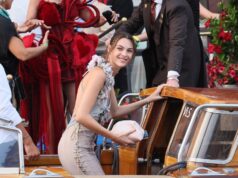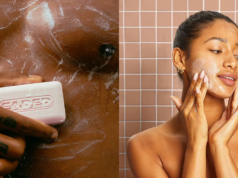While Chanel N°5 celebrates its centennial this year, many would argue the scent is as resonant today as it was in 1921. In 2019, an item infused with its fragrance—a perfume, shower gel, or soap—was purchased in America every minute, either in person or online. So at a time when beauty trends come and go with the swipe of a thumb, it begs the question: What makes an icon everlasting?
Chanel N°5 is both recognizable and unique to each individual. “It is not that certain notes [in N°5] smell differently on each woman’s skin,” says Olivier Polge, Chanel’s in-house perfumer creator. “It’s more about the complexity of notes that resonate in a very personal way according to the woman wearing them.”
That nearly bespoke feel is due to a blend of over 80 notes and accords, from rich sandalwood and ylang-ylang to citrusy bergamot and orange blossom to a copious amount of specially sourced jasmine. The formula—a guarded secret, of course—also includes aldehydes, synthetic elements that add a heady je ne sais quoi. They were cutting-edge when Gabrielle “Coco” Chanel introduced the scent in 1921. At the time, single-note floral scents dominated the market, so the mix itself broke the mold as the opposite of the era’s monotone florals.
“She wanted to make sure people would say, ‘You smell good,’ and not, ‘You smell like rose or jasmine,’ ” explains Thomas du Pré de Saint Maur, Chanel’s head of global creative resources for fragrance and beauty, fine jewelry, and watches. “The only thing that counted was the woman.”
The abstract scent wasn’t the only thing that made Chanel N°5 unusual for its time. Prior to the ’20s, perfumes usually had fanciful names like Guerlain’s L’Heure Bleue—an ode to the time each day when the sky is at its deepest hue. Most fragrances, including Guerlain’s, came in ornate, detailed bottles with swirled motifs carved into the glass. N°5’s sleek, geometric bottle couldn’t be more different.
Rumors abound as to the inspiration for the silhouette, including the stopper, which some say mirrors the geometry of the Place Vendôme, seen from Chanel’s favorite suite at The Ritz Paris. The shape and design ushered in a totally new aesthetic in the world of fragrance.
Coco Chanel also enshrouded her choices in mystery. Historians often ponder her fixation with her lucky number, five. The fragrance may have been introduced on the fifth day of May, the fifth month, for example. And then there’s the name, said to be the inevitable choice when the nose she worked with, Ernest Beaux, presented her with various numbered options of the formula.
“The vagueness around the perfume is part of the whole mystique and created quite intentionally by Beaux and Chanel,” says Lisa Chaney, author of Coco Chanel: An Intimate Life. Ultimately, Chanel had a knack for understanding what women appreciated and would continue to appreciate. It’s hard to imagine the more avant-garde scents of today, like Escentric Molecules Molecule 01 (a cult-loved mix of synthetic and natural notes in a sharp-lined bottle), existing without Chanel N°5 before them.
“She wanted to give the message of modernity,” Chaney says. “She had this uncanny instinct for being one step ahead of her time.”
This article originally appeared in the June/July 2021 issue of ELLE Magazine.
Get the Latest Issue of ELLE









